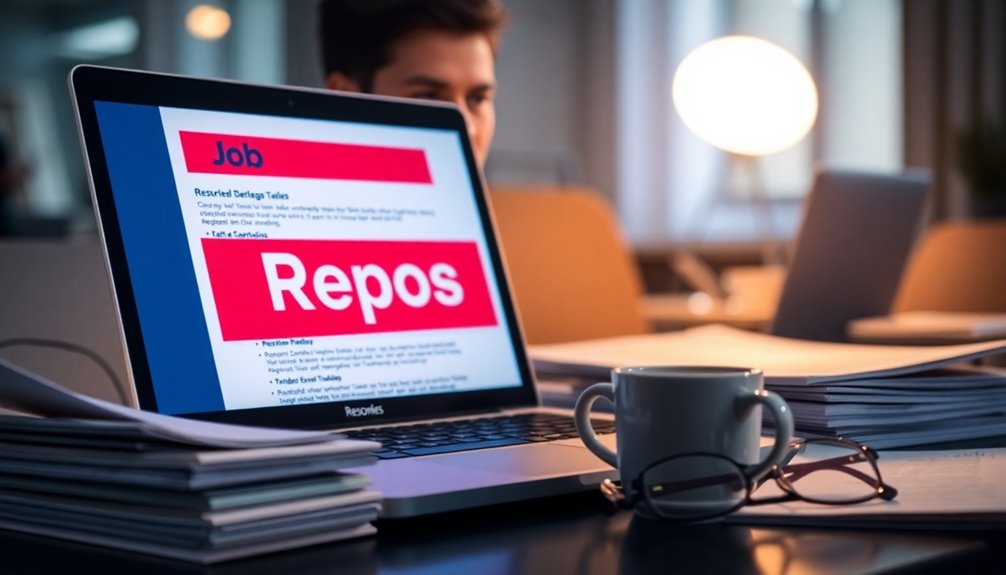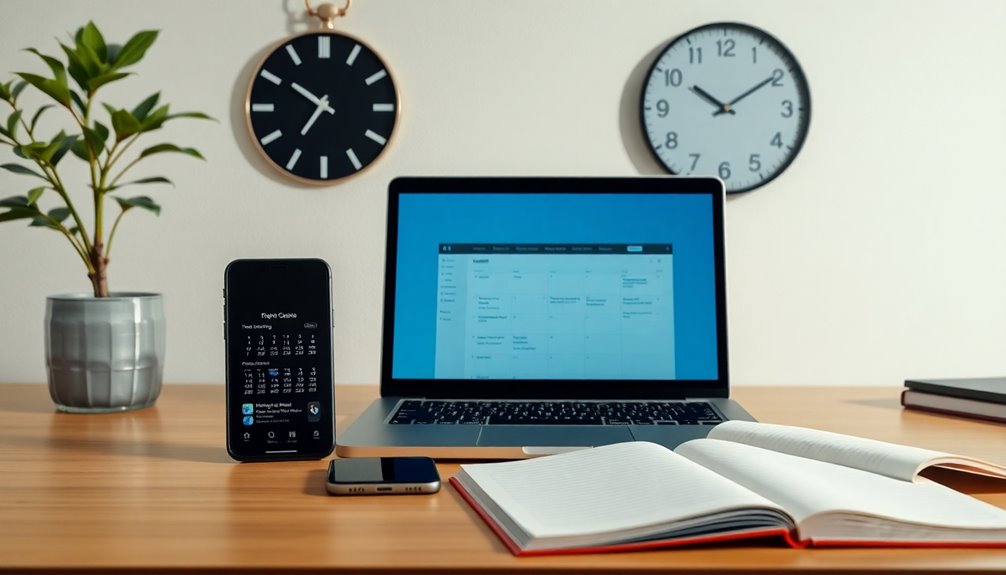To nail your interview, focus on mastering key questions. Start by understanding common inquiries like your strengths, weaknesses, and motivations. Align your skills with the job description, highlighting relevant experiences and achievements. Use the STAR method to showcase problem-solving abilities effectively. Remember to articulate your motivations and how they connect to the company's mission. When discussing salary expectations, research market values and be open to negotiation. By presenting a compelling narrative, you'll leave a lasting impression. There's much more to explore to truly elevate your interview performance.
Key Takeaways
- Prepare tailored responses to common interview questions by aligning your skills with the job description and company values.
- Use the STAR method to clearly articulate your problem-solving experiences, highlighting your contributions and successes.
- Reflect on your motivations for the role and express genuine enthusiasm for the company's mission and growth opportunities.
- Discuss your salary expectations based on market research, considering both salary and non-salary benefits for a comprehensive evaluation.
- Practice articulating your strengths and weaknesses with context, showcasing personal achievements and improvement efforts in your career.
Common Interview Questions

When preparing for an interview, understanding common questions can make a significant difference in how you present yourself. One of the most common questions you may encounter in an interview is “Tell me about yourself. ” This is your opportunity to give a brief overview of your professional background and highlight your accomplishments. Another common question is about your strengths and weaknesses. It’s important to have specific examples ready to demonstrate your strengths and show self-awareness when discussing weaknesses. Using interview question strategies, such as practicing your responses and conducting research on the company, can help you feel more prepared and confident during the interview process.
You'll likely face inquiries about your strengths, weaknesses, and motivations. It's crucial to tailor your responses to reflect both the job description and the company's values.
Think about your personal achievements and experiences that illustrate your qualifications. For example, when discussing weaknesses, choose one relevant to the role, provide context, and explain how you've worked to improve.
Researching the company's products, services, and culture will help you align your values with theirs.
Practicing your answers beforehand not only boosts your confidence but also guarantees you convey your best self during the interview.
Aligning Skills With Job Descriptions

Frequently, candidates overlook the importance of aligning their skills with job descriptions, which can greatly impact their chances of success.
When you tailor your skills to match the job requirements, you showcase your suitability and readiness for the role.
Here are four strategies to effectively align your skills:
- Review the Job Description: Identify key skills and qualifications the employer seeks.
- Highlight Relevant Experiences: Use specific examples from your past that demonstrate your abilities.
- Emphasize Hard and Soft Skills: Balance technical skills with interpersonal traits that the role demands.
- Showcase Achievements: Discuss accomplishments that reflect both your skills and the company's needs.
Understanding Your Motivations

Aligning your skills with job descriptions sets a strong foundation, but understanding your motivations takes your preparation to the next level. Employers want to know what drives you and how your goals align with their mission.
Reflect on what excites you about the role—be it challenges, teamwork, or opportunities for growth. Articulate your intrinsic motivators, like a passion for innovation or a desire to lead.
Discuss your career aspirations, such as developing specific skills or advancing to leadership positions. This not only shows your commitment but also illustrates how you envision your future with the company.
When you express genuine enthusiasm for the role, you create a compelling narrative that resonates with hiring managers, making you a standout candidate.
Utilizing the STAR Method

To effectively showcase your problem-solving skills during an interview, utilizing the STAR method can be a game changer.
This structured approach helps you articulate your experiences clearly and confidently.
Here's how to implement it:
- Situation: Describe the context or challenge you faced.
- Task: Explain your specific responsibility in that situation.
- Action: Detail the steps you took to address the challenge.
- Result: Share the outcome of your actions, emphasizing successes or lessons learned.
Discussing Salary Expectations

Steering salary expectations can feel intimidating, but it's an essential part of the interview process. Start by researching typical salaries for your role based on experience and location. This preparation helps you articulate a reasonable salary range. Be honest about your salary history, as it reflects your market value. Additionally, understanding retirement savings options can provide insight into the overall compensation package. Investing in options like Gold IRAs can also enhance your financial security in retirement. Additionally, many employers offer 401(k) matching contributions as a valuable part of the total compensation package.
| Factors | Considerations |
|---|---|
| Experience Level | Align with your years of work |
| Industry Standards | Research salary benchmarks |
| Company Size | Larger firms may offer more |
| Location | Factor in cost of living |
| Non-Salary Benefits | Consider perks like flexibility |
Stay open to negotiations and remember that compensation isn't just about salary; benefits can also add significant value. Additionally, consider how tax advantages may impact your long-term financial goals. Be confident in presenting your expectations.
Showcasing Unique Qualifications

When preparing for an interview, it's crucial to highlight your unique qualifications that set you apart from other candidates.
You'll want to focus on your personal strengths and skills, ensuring they align with the job description. Here are some effective ways to showcase your uniqueness:
- Tailor Your Stories: Share specific examples that demonstrate how your experiences align with the role.
- Highlight Recognition: Mention any accolades or praise from previous employers to illustrate your impact.
- Demonstrate Specific Skills: Clearly articulate hard and soft skills that are relevant and valuable for the position. Developing critical thinking skills can also showcase your ability to approach problems creatively. Practicing mindfulness techniques can enhance your self-awareness, which is crucial in interviews.
- Showcase Accomplishments: Discuss your greatest achievements and how they reflect your work ethic and values. Additionally, showcasing your ability to navigate mediation services can indicate strong conflict resolution skills essential for teamwork.
Additionally, consider how your experiences can reflect your understanding of emotional alignment in navigating workplace dynamics.
Handling Behavioral Insights

Understanding behavioral insights is essential in interviews, as they reveal how you handle various situations and challenges. Using the STAR method (Situation, Task, Action, Result) can help structure your responses effectively. This technique not only showcases your problem-solving skills but also highlights your adaptability in different scenarios.
Here's a quick reference to behavioral insights:
| Insight Type | Key Focus |
|---|---|
| Conflict Resolution | How you handle disagreements |
| Accountability | Taking responsibility for actions |
| Goal Setting | Planning for short-term achievements |
Frequently Asked Questions
How Should I Dress for an Interview?
When you're preparing for an interview, your outfit matters. You should aim for professional attire that aligns with the company's culture.
If the company is formal, wear a suit or business dress; if it's more casual, opt for smart casual attire. Make sure your clothes are clean and well-fitted.
Pay attention to grooming and accessories, keeping them minimal. Dressing appropriately shows respect and helps you feel confident during the interview.
What Documents Should I Bring to the Interview?
When you're heading to an interview, it's essential to bring the right documents.
Make sure you have multiple copies of your resume, a list of references, and any relevant certifications or portfolios.
Also, jot down questions you want to ask the interviewer.
Bringing these materials shows you're prepared and organized.
It helps you feel confident and ready to discuss your qualifications, making a positive impression on your potential employer.
How Early Should I Arrive for the Interview?
Showing up to an interview like it's a first date? Don't be late! Aim to arrive about 10-15 minutes early.
This gives you time to settle in, gather your thoughts, and show respect for the interviewer's time. However, don't overdo it—arriving too early can be awkward.
Use those minutes to observe the environment and mentally prepare to discuss how you can contribute to the team.
You've got this!
Can I Ask About the Team I'll Work With?
Absolutely, you can ask about the team you'll work with! It shows your interest in collaboration and the work environment.
Inquire about team dynamics, roles, and how they interact on projects. This not only helps you gauge if you'll fit in but also demonstrates your proactive approach.
Plus, understanding the team can give you insights into how your skills align with their needs, making your potential contributions clearer to everyone involved.
What Should I Do After the Interview?
After the interview, send a thank-you email to express your appreciation for the opportunity.
Reiterate your enthusiasm for the role and mention something specific from the conversation that resonated with you. This keeps you fresh in their minds.
Then, be patient. While you wait for a response, continue researching the company and preparing for potential next steps.
Staying proactive shows your genuine interest and keeps you ready for whatever comes next.
Conclusion
Now that you've got the tools to nail your interview, remember that preparation meets opportunity in unexpected ways. Just like stumbling upon a hidden gem in a familiar place, your unique skills and experiences can shine when you align them with the company's vision. Embrace the journey, stay authentic, and let your passion resonate. Who knows? That perfect connection might be just around the corner, waiting for you to make your mark. Go in with confidence—you've got this!









